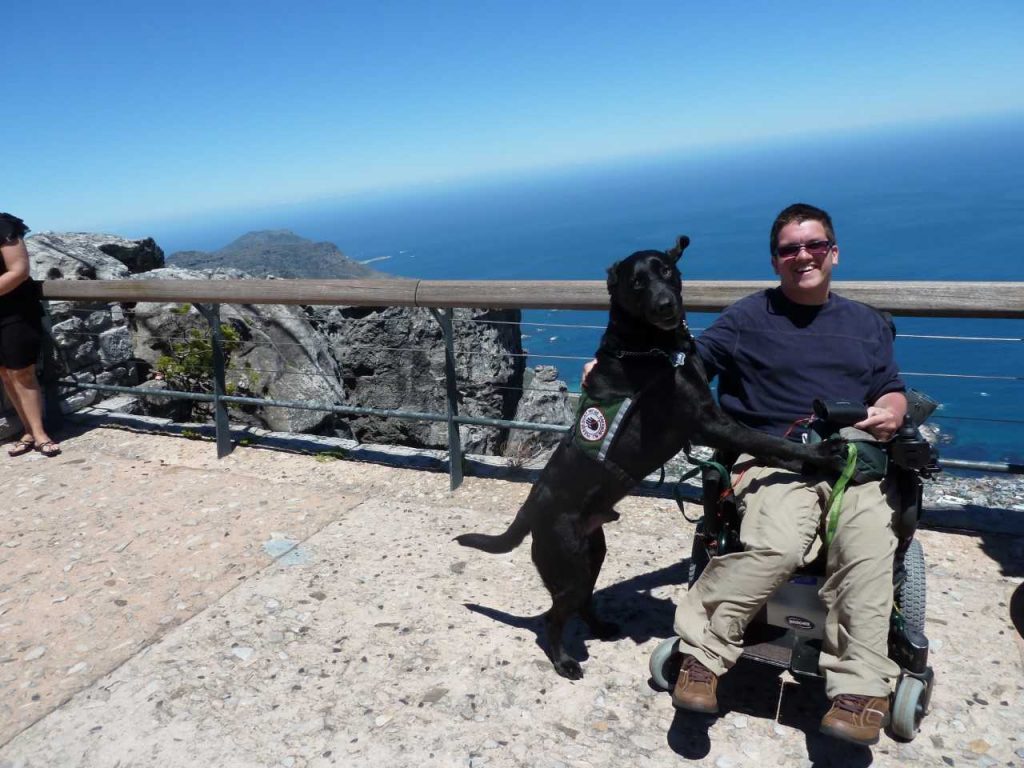The Amandla Project: An SIT alum helps students with disabilities intern abroad
November 1st, 2018 | Africa, Alumni, Careers, DEIA, SIT Graduate Institute

Alex Stone went abroad as a Seattle University undergrad, pursuing an internship in South Africa in 2011. It’s a common enough story, but his trip worked a little differently — he had a constant companion, a service dog named Fraser. Alex, who has cerebral palsy and uses a powered wheelchair, worked for the African Disability Alliance. With Fraser at his side, Alex developed his skills in nonprofit fundraising. He also came up with an intriguing vision for the future.
Students with disabilities, Alex explains, don’t go abroad as often as their peers. “My experience was awesome, but it was also pretty rare.”
He wanted to help other students follow a similar path. It wasn’t long until, via the study abroad office at his university, he heard about SIT Graduate Institute and met an alum. “What drew me to SIT was that I had a concept in mind but no idea how to make it a reality.”
SIT proved to be a perfect fit. Alex joined the low-residency program in international education and, under the guidance of his professors, graduated in 2016 with “a plan ready to launch, and also a new career path for me.”
Right now, Alex works as a philanthropic giving officer for Summit Assistance Dogs in Seattle, Washington, from whom he received Fraser in 2006. But his new organization, The Amandla Project, is quickly becoming a career path of its own. The Project offers eight-week summer internships with organizations serving South Africans with disabilities, in roles that match their professional and academic goals. The program also features weekly leadership development experiences led by South African icons.
Amandla means “empowerment” in two languages — Zulu and Xhosa. And the project gained a new infusion of power and possibility when it received first prize in Diversity Abroad’s Innovation Competition last April. In mid-October, Alex also discussed his organization’s work at the NAFSA: Association of International Educators Region 1 conference as part of the presentation “Is it Accessible?: Re)Designing Education Abroad with a Disability Lens,” with co-presenters Ashley Holben of Mobility International USA and Shun Yanagashita of SIT Study Abroad.
In that presentation, Alex and his co-presenters addressed some of the changes to study abroad programs that can make them accessible to a wider array of students. With Amandla, Alex has already designed an abroad experience that makes such changes a reality.
“Transportation, accessibility, housing, and inaccessible curricular design are common obstacles,” Alex says, “and my program addresses that, in that it’s structured as a nonprofit. All the participants’ costs are covered.”
His guiding principle is simple: “Anything can be dealt with with planning.”
Alex says he sees accessibility as a growing issue. “It’s definitely a trending topic in international education — our NAFSA session was popular. It’s also an issue with a lot of progress to be made. The main reason I’m so passionate is that I know the difference my contribution can make to my community. If education abroad was available to more people, they would definitely take advantage of it. I view it as a social justice issue.”
Thanks to SIT, Alex can approach the issue with an unusual set of resources. “I use everything from program design to intercultural communications with Amandla. But beyond that, I’m in close contact with my SIT cohort. They’re really great for bouncing ideas around. I feel like I gained a whole network of advisors. I feel very lucky to have pursued this degree.”
